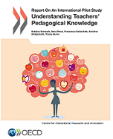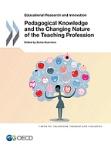Centre for Educational Research and Innovation - CERI
ITEL - Publications and Reports
Publications and Reports< Back to Innovative Teaching for Effective Learning What Difference do Networks Make to Teachers' Knowledge? The paper investigates two – often disconnected – policy questions: how can we scale the use of evidence in teaching practice, and how can we generate and scale innovation? It explores the role of networks in scaling evidence and innovation through a review of literature and a number of short case descriptions.
The Relevance of General Pedagogical Knowledge for Successful Teaching This systematic review synthesises the empirical evidence of 10 769 teaching professionals and 853 452 students from primary to tertiary education in 21 countries. The overall effects for 20 quantitative studies (Cohen’s d = .64 and .26) and three themes emerging from 31 qualitative studies underline that general pedagogical knowledge is a crucial resource for teaching and fostering student learning.
What Difference do Standards Make to Educating Teachers? This OECD Working Paper seeks to answer the following questions: What does aligning teacher education programmes to standards really mean?; To what extent is this achieved and what are the obstacles? The paper reviews evidence on the interplay between professional standards for teachers, the content of teacher education and educational sciences. It illustrates these interactions through three case studies from Estonia, Australia and Singapore.
Harnessing Spatial Thinking to Support STEM Learning This report reviews research showing that (a) spatial thinking and STEM (science, technology, engineering and mathematics) learning are related, and (b) spatial thinking is malleable. It evaluated two strategies for exploiting these findings in education.
Assessing Teachers’ General Pedagogical Knowledge The report provides a review of the empirical research on assessing teachers’ general pedagogical knowledge with the purpose to inform the design of an international assessment instrument.
Teacher Motivation Research and its Implications for the Instructional Process An overview of current research on teacher motivation, major theoretical frameworks guiding this research, available assessments of teacher motivation, and implications for the instructional process.
The Neuroscience of Mathematical Cognition and Learning An insight into the neuroscience research underpinning maths learning and cognition - with the aim of better equipping educators and policy makers with the scientific knowledge underlying maths acquisition, as well as hindrances to learning such as maths anxiety or dyscalculia.
|
Related Documents

